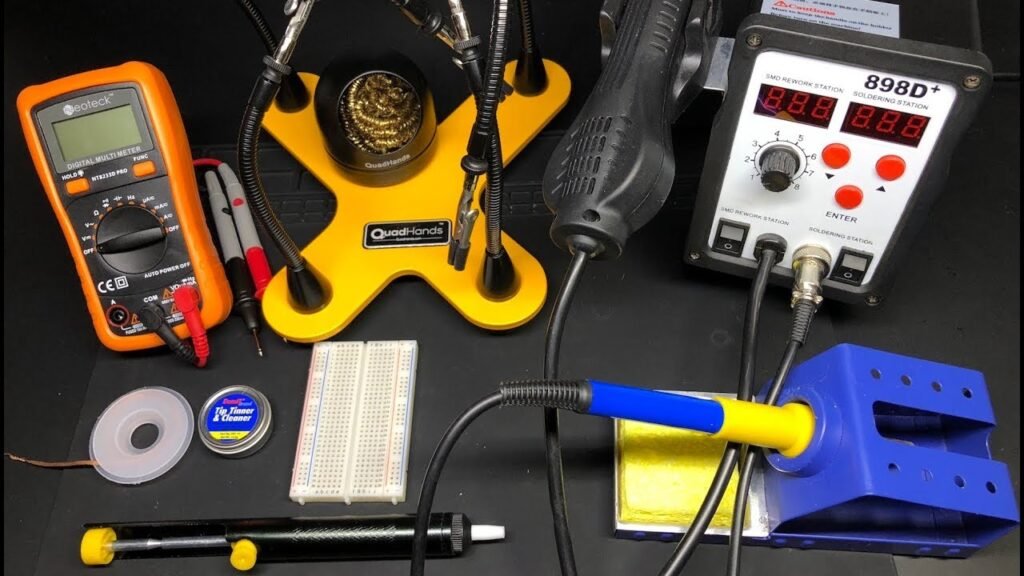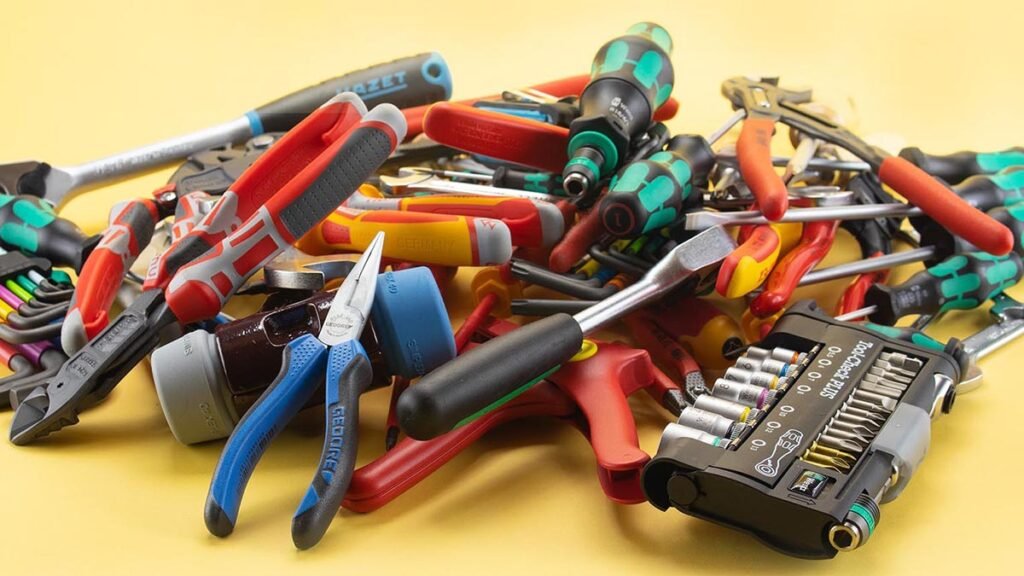Electronic tools are gadgets that make tasks easier and faster, especially in DIY projects or professional jobs. These tools use electricity or batteries to operate, offering precision and efficiency in various tasks like repairs, building, and crafting. Whether you’re an expert or just starting, having the right electronic tools can save you time and effort.
From soldering irons to digital multimeters, electronic tools are used in a wide range of fields. They are essential for electricians, hobbyists, and even engineers. Knowing the right tools and their uses can help you choose the perfect gadgets for your needs. We will go over the fundamental devices, their benefits, and safe use in this blog.
What Are Electronic Tools and Why Are They Important?
Electronic tools are devices powered by electricity or batteries, designed to make technical and repair tasks easier. They are vital for professionals and hobbyists alike, helping with tasks like building, repairing, and testing electrical systems. From simple screwdrivers to advanced multimeters, these tools have become essential in today’s tech-driven world.
For example, a soldering iron is used to join electrical wires, while a multimeter helps test electrical circuits. These tools ensure precision, speed, and safety. Without them, even basic tasks in electronics would be challenging.
Whether you’re setting up a home project or working on complex electrical systems, electronic tools are your best friends. They not only save time but also improve the quality of your work, ensuring everything is done correctly the first time.
Types of Electronic Tools and Their Uses
Handheld Tools
Handheld electronic tools are easy to carry and perfect for basic repairs and maintenance. These include tools like screwdrivers, wire strippers, and crimping tools.
- Screwdrivers: Used for tightening or loosening screws in devices.
- Wire Strippers: Essential for removing insulation from wires during installations.
- Crimping Tools: Used to attach connectors to wires securely.
The two fledglings and specialists will track down these apparatuses ideal. They are simple to use, affordable, and crucial for everyday tasks.
Testing Tools
Testing tools are used to check the functionality and safety of electrical systems. These include:
- Multimeters: Measure voltage, current, and resistance.
- Continuity Testers: Ensure that circuits are complete and working.
- Oscilloscopes: Analyze electronic signals in detailed projects.
These tools are indispensable for troubleshooting issues in electronic devices, ensuring everything works smoothly.
Essential Electronic Tools for Beginners
Starting with the right tools is key for anyone learning electronics. Coming up next is a rundown of fundamental instruments for beginners:
Soldering Equipment
Soldering tools are vital for connecting wires and components. Essential items include:
- Soldering Iron: Heats metal to join wires.
- Solder Wire: The material used for making connections.
- Soldering Stand: Ensures safety while the iron cools.
These tools help beginners learn the basics of circuit building and repairs.
Basic Hand Tools
- Pliers: Used for gripping and bending wires.
- Cutters: Trim wires to the desired length.
- Tweezers: Handle small components with precision.
These tools are easy to use and great for small projects, making them ideal for learners.
Advanced Tools for Professionals
Diagnostic Tools
Professionals need advanced diagnostic tools to troubleshoot complex systems. Examples include:
- Digital Multimeters: Provide highly accurate readings.
- Power Analyzers: Monitor energy usage in circuits.
- Thermal Cameras: Detect overheating in electrical components.
These tools ensure accuracy and efficiency in professional projects, minimizing errors.
Specialized Equipment
- Oscilloscopes: Analyze waveforms in real-time.
- Signal generators: Assess how a circuit responds in different situations.
- SMD Rework Stations: Repair tiny components on circuit boards.
Such tools are designed for experts who handle intricate systems and require precision.
Choosing the Right Electronic Tools
Factors to Consider
Picking the right tools depends on your needs. Keep these factors in mind:
- Purpose: Are you working on basic repairs or advanced projects?
- Budget: Invest in high-quality tools that fit your budget.
- Brand: Reputable brands often provide reliable and durable tools.
By choosing wisely, you can avoid unnecessary expenses and enjoy long-lasting performance.
Recommended Brands
- Fluke: Known for multimeters and testing tools.
- Hakko: Popular for soldering equipment.
- Bosch: Offers a wide range of durable hand tools.
Prior to making a purchase, consistently assess highlights and surveys.
Maintaining and Storing Your Electronic Tools
Proper maintenance ensures your tools last longer and work efficiently. Follow these tips:
- Clean As often as possible: After each utilization, gather up any residue or soil.
- Inspect for Damage: Check for wear and tear before using.
- Store Safely: Use toolboxes or dedicated shelves to prevent damage.
Cleaning Tips
- Use a soft cloth for wiping tools.
- Apply rust remover on metal parts if needed.
- Keep soldering tips clean with a sponge.
Storage Ideas
- Tool Bags: Portable and easy to organize.
- Wall Racks: Save space and keep tools accessible.
- Toolboxes: Offer secure storage for expensive equipment.
Proper care not only extends the life of your tools but also ensures safety during use.
The Future of Electronic Tools
The world of electronic tools is evolving with new technologies. Modern tools are becoming smarter and more efficient, incorporating features like:
- Wireless Connectivity: Tools that connect to smartphones for data tracking.
- Eco-Friendly Designs: Devices made with sustainable materials.
- AI Integration: Advanced tools that analyze and optimize performance.
These innovations promise to make electronic work faster, safer, and more precise.
Conclusion
Electronic tools have revolutionized the way we handle repairs and projects. From basic hand tools to advanced diagnostic equipment, these gadgets make our work easier, safer, and more efficient.
Whether you’re a beginner starting with simple tools or a professional using high-tech equipment, investing in the right tools is essential. By choosing wisely and maintaining them properly, you can enjoy long-lasting performance and excellent results.
FAQs
Q: What are electronic tools used for?
A: Electronic tools are used for building, fixing, and testing electrical systems and devices.
Q: Which electronic tool is best for beginners?
A: A soldering iron and a multimeter are great starting tools for beginners.
Q: How do I maintain my electronic tools?
A: Clean them regularly, inspect for damage, and store them in a safe place.
Q: What is the difference between basic and advanced tools?
A: Basic tools are for simple tasks, while advanced tools handle complex projects with precision.
Q: Can I use one tool for multiple tasks?
A: Some tools, like multimeters, are versatile, but specialized tasks may require specific tools.
Q: Where can I buy electronic tools?
A: You can purchase them from hardware stores or online retailers like Amazon or specialized tool shops.


